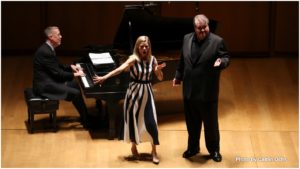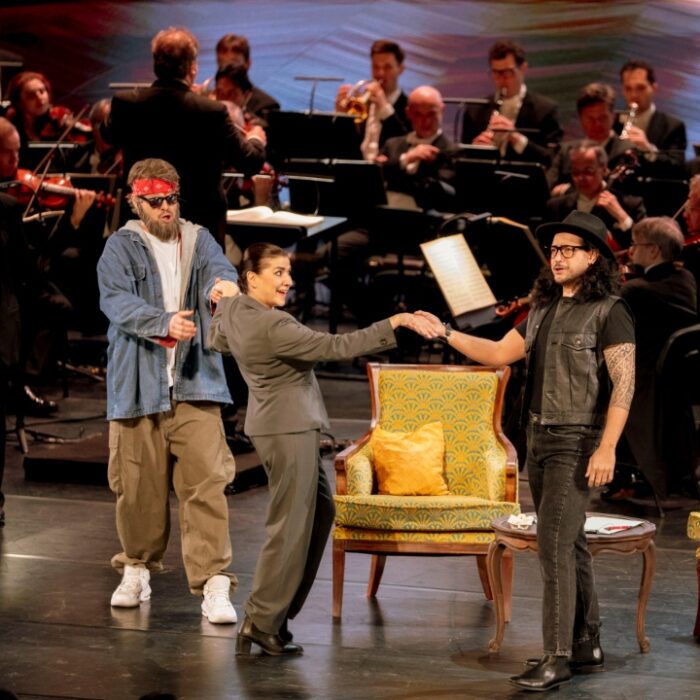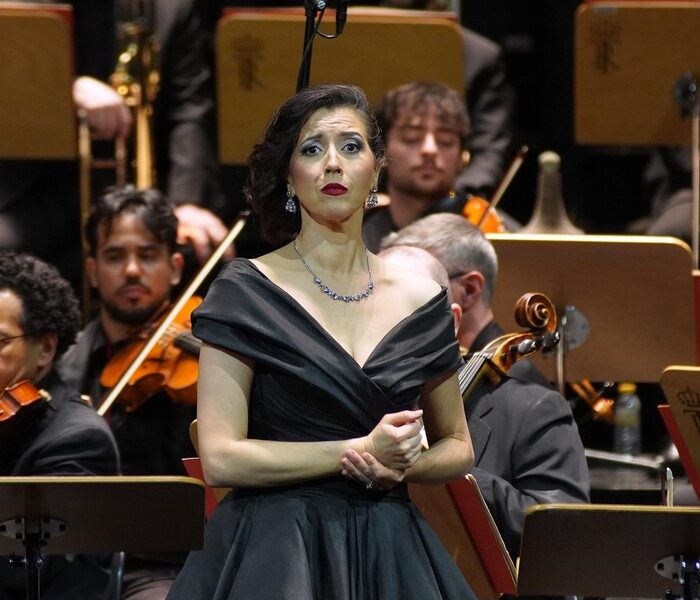
George London Foundation Recital Series Review: Anthony Dean Griffey & Amy Owens
A Joyous Evening Of Beautiful Singing & Acting
By Nicole KuchtaOn Sunday, Mar. 24, 2019, attendees of the second George London Foundation recital of the season were treated to a wonderful display of vocal talent and theatricality. Tenor Anthony Dean Griffey, a regular on the stages of the world’s leading opera houses, and soprano Amy Owens, winner of the $5,000 prize during the 2018 George London Competition, were featured in a recital marked by contrasting pieces which highlighted both their vocal and acting abilities.
The George London Foundation Recital Series, in collaboration with The Morgan Library & Museum, presents pairs of exceptional classical singers – an established performer and an emerging star – in a series of three recitals each season. The ultimate goal of the Foundation is to provide support, emotional and financial, to talented young singers at the start of their opera careers.
Song Cycles & Arias
The recital began with Frank Bridge’s song cycle “Three Songs for Tenor, Cello, and Piano,” featuring tenor Anthony Dean Griffey, cellist David Heiss, and pianist Warren Jones. As the first notes of “Far, far from each other” escaped Griffey’s lips, the auditorium quickly filled with rich, resonant melody. The graceful fluidity of the tenor’s sound and motion on stage gave off a lullaby vibe, and climaxed in a moment of hope and assurance (“Ah, calm me! restore me, And dry up my tears On thy high mountain platforms, Where Morn first appears”). The dynamic contrasts, interspersed with pregnant silences, of “Where is it that our soul doth go?” freed the audience from the hypnotic grip of Griffey’s first song, showcasing his ability to not only entrance his listeners with sublime lyrical beauty but excite them with an aura of human vulnerability. With “Music, when soft voices die,” Griffey concluded his pensive, melancholy journey toward coming to terms with the nature of life, leaving me eager to see whether he would be able to pull himself out of such sincere character and carry out the emotional transformation necessary to perform the more lighthearted pieces yet to come.
Soprano Amy Owens made her first appearance on the stage alongside Jones and violinist Cindy Wu for Donald Waxman’s “Lovesongs for Soprano, Violin, and Piano.” With this song cycle, Owens established her penchant for contrast, which ultimately served to underscore her theatricality. Starting with “Lovesong,” the soprano hinted at the strength of her upper register with seemingly effortless, vibrant high notes, made all the more distinguishable by a markedly restrained use of vibrato throughout the piece. The tempo picked up with “The Mad Maid’s Song,” followed by “Nocturne,” which accentuated Owens’ bright timbre and youthful spirit. The Cinderella-esque text was a medium through which she could emote wonder, excitement, and anticipation (“Now, revealing night Unfolds in splendor; And takes our hands within its own to hold…”), and then reveal depth of character with her mature acceptance of the beauty of love’s transience (“As stars shall die in dawn’s first sky, So love must end, but sweetly.”). The fourth and final song in the cycle, “A Bygone Occasion,” again showcased the soprano’s youthfulness, this time through zealous speed.
Griffey returned with two arias by composers “near and dear to [my] heart,” Carlisle Floyd and the late André Previn, who provided repertoire which offered him a place in the opera world. Though he had originally planned to start with Previn, according to the program, he began instead with Sam’s aria from Floyd’s opera “Susannah.” He was able to effectively portray the deep despondency of one who’s seen error in society’s ways (“Way out yonder somewhere, the Lord’s great heart must break At seein’ how men treat one another An’ say they’re doin’ it all fer his sake”). Griffey wished to pay homage to Previn with Mitch’s aria from “A Streetcar Named Desire,” which was written with the tenor in mind after Previn first heard him at the Tanglewood Festival. The emotionally charged aria, which speaks of overcoming loss by maintaining steadfast belief in love (“When you lose the one you love . . . what do you do? You still believe in love.), was indeed an appropriate tribute to Previn – he may no longer be physically here with us, but he and his music clearly remain beloved.
Owens then returned to flaunt her technical and theatrical prowess with Zerbinetta’s aria “Großmächtige Prinzessin” from R. Strauss’ “Ariadne auf Naxos.” Her voice resplendent and energy high, the soprano amused her audience with comedic charm. At one point, her dazzling cadenza ran on so long that when she turned to face Jones on the piano, his face read [jokingly, of course] “Are you finished?” Her face seemed to reply: “Yes, now your diva is done!” Except she wasn’t. The vocal acrobatics went on and on in a brilliant display. Admittedly, she commanded such attention that it was difficult for me to keep up with the text in the program!
After the intermission, Owens performed Darius Milhaud’s “Chansons de Ronsard,” another cycle of contrasting songs. Her final note of “À une fontaine,” a joyous melody, was beautifully sustained, and her remarkable dynamic control in the seraphic “À Cupidon” resulted in deeply expressive phrasing, particularly in the last three stanzas. The next song, “Tais-toi, babillarde Arondelle,” was the complete opposite of “À Cupidon” – it was fast, fun, and sassy. As the soprano sang of silencing the morning birds, she herself became one of them, with those piping cascades of coloratura! Keeping with the theme of contrast, Owens quickly changed her mind about the birds in the next song “Dieu vous gard'” (“God be with you, faithful messengers of Spring . . . “). Her youthful exuberance had certainly captured the hearts of the crowd, evident by the applause.
With John Jacob Niles’ upbeat piece “The Roving Gambler,” we began to see the lighter side of Griffey. However, I found that Charles Ives’ “The Circus Band,” which followed Niles’ “Black is the Color of My True Love’s Hair” and Ives’ “Berceuse,” was much more effective at showcasing his comedic acting abilities. Vocally, he was more colorful and expressive, and his increased liveliness (physicalizing the search for the “lady all in pink,” for example) contributed to the crowd-pleasing humor of the piece.
A Bit of Broadway
The two stars finally had a chance to perform together two contrasting show tunes: “The Song That Goes Like This” from Eric Idle’s “Spamalot,” a parody of the cliché happy ending finale, and “You Are Love” from Jerome Kern’s “Show Boat,” a beloved classic. The melodramatic “Spamalot” number drew plenty of laughs from the crowd. The chemistry between the two performers in both numbers, however, was not quite one-hundred percent. There were times that the two seemed genuine with one another, more so during “The Song That Goes Like This,” but the program could have benefitted from having Griffey and Owens perform at least one piece together earlier on in the recital so as to establish a connection which could develop throughout the duration of the recital, especially considering the recurring themes of maturation and awareness in many of the texts. The two voices themselves, however, blended beautifully in “You Are Love.”
Overall the recital was an absolute success – both Griffey and Owens made it clear that they are extraordinarily talented singers, as well as skilled actors.


